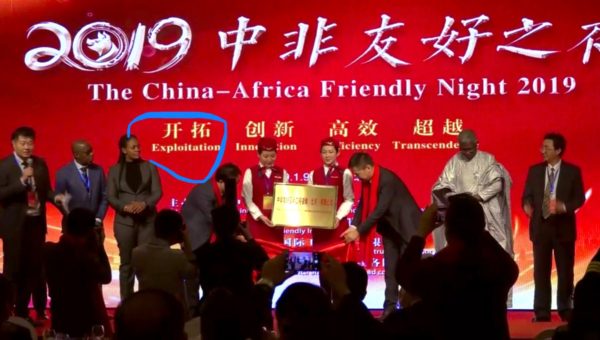Things got lost in translation last month during a major China-Africa friendship event, and critics are hopping mad.
The 2019 China-Africa Friendly Night kicked off Jan. 9 in Beijing as top African diplomats and business officials, along with dozens of Chinese enterprises and representatives from African nations involved in China’s Belt and Road initiative on the continent gathered for a night of fun and fellowship, Quartz Africa reported.
A giant video screen behind the stage displayed buzzwords describing the relationship between the two sides: Innovation, Efficiency, Transcendence — and “Exploitation”?

Critics saw the awkward “exploitation” faux pas as a Freudian slip on the part of the Chinese. (Image courtesy of @EffyZhangmy / Twitter)
The gaffe was seemingly an awkward translation of the Chinese character 开拓 (kaituo), which can be translated as “development,” “exploration,” or even “pioneering.” According to Shanghaist, the faux pas did not get much attention until Caixin reporter Effy Zhang posted a screenshot from the event on Twitter over the weekend.
“Gosh. This’s so wrong,” Zhang wrote. “With dozens of African envoys presented, a mindless mistake was made. At least ask someone really knows English to interpret.”
The tweet sparked a flurry of angry reactions from users who saw the mistake as less of a sloppy translation error and as more of a revealing Freudian slip. The gaffe comes as China faces criticism at home and abroad for its growing trade and economic investments in what some have called a new era of colonialism on the continent.
“That awkward moment when your propaganda accidentally tells the truth,” said one Twitter user. “Somebody on their management team is going to prison for a looooong time.”
“There was no mistake there,” another chimed in. “That’s exactly what they are doing in Africa. African governments have prostituted their sovereignty in exchange for money. The relationship between China & Africa is similar to that between a prostitute and her patron.”
A fellow user joked that unlike their American or European counterparts, “the Chinese are honest.”
Linguists like John Wang disagreed with the Freudian slip assertion, however, and said the slip-up had more to do with the careless translation process. Others argued that it highlighted the lack of African involvement in the program’s planning, which would’ve prevented such a gaffe from being printed in the first place.
“In history, many political problems have been caused by translation problems,” Wang, an assistant professor of translation studies at Jinan University, told Quartz Africa. He argued that while the lack of attention to translation leads to these mistakes, “belittling the results of translation is likely to have a greater negative impact.”
Over the past 20 years, China’s diplomatic, trade, military, and economic investments in Africa have boomed. However, it has since been accused of exploiting the continent’s natural resources and entrapping African governments in debt with pricey infrastructure projects, according to Shanghaist.
Just last year, China opened its 13th Chinese Community and Police Co-Operation Center in South Africa, which was established to improve relation and communication between South African police and the local Chinese community. Meanwhile, in Djibouti, China constructed its own military base, where it joins American, French, and Japanese military installations in the strategically located nation on the Horn of Africa. Moreover, a growing number of African students, from Kenya to Uganda, are also now studying Mandarin in school.
“The reason this particular example has been shared so much is because it touches on a nerve: a concern of exploitation of African countries by China,” Hannah Ryder of the Beijing-based international consultancy Development Reimagined told Quartz Africa. She noted that the challenges of planning cross-cultural events can be addressed by making sure that African stakeholders are involved in the organization, not just the participation.
“Diverse teams are able to spot these kinds of mistakes and address sensitive issues that might not be obvious to everyone,” she added.